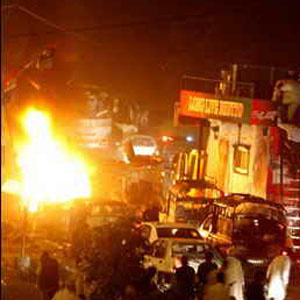Islamabad Blast: Politico-Security Tremor at Marriott
A note by Morad Veisi, an expert in neighboring countries affairs

The deadliest suicide attack in the history of Islamabad is a full-length mirror of the new situation in Pakistan and the region as well as the strategic developments in the surrounding environment of Iran’s eastern borders.
A note by Morad Veisi, an expert in neighboring countries affairs
The deadliest suicide attack in the history of Islamabad is a full-length mirror of the new situation in Pakistan and the region as well as the strategic developments in the surrounding environment of Iran’s eastern borders. The blast at Marriott Hotel was a tremor that was predictable on the numerous faults of the Pakistani society but what was unknown was its precise time and location.
A thorough investigation into the sophisticated dimensions of the Marriott bombing shows that the politico-security developments in Iran’s eastern neighbors (Pakistan & Afghanistan) are taking place in the presence of numerous players who have many differences and conflict of interests. The consequences of these developments and the conflict of interests on Iran’s security is such that we could not remain mere spectators under conditions that other players are carefully watching the events, teaming up and adopting new tactics and strategies to safeguard their security and interests.
The tide of extremism has begun hurting and the Americans are preparing to gradually move their troops from Iraq to Afghanistan on the pretext of a more serious confrontation with extremism. The regions around Iran’s eastern borders will be facing escalation of clashes between various players so that the US war against the Taliban and al-Qaeda would be just part of this big battle. In Pakistan where religious extremism is world renowned, the Taliban and al-Qaeda are just the tip of the iceberg.
The extremist fundamentalists who were said to be clipped into pieces by President Asi Ali Zardari on the one hand and the United States on the other, displayed the extent of their power by crashing an explosives-laden truck into the security gates of Islamabad’s five-star Marriott Hotel – a blast described as the 9/11 of Pakistan.
The Americans were hoping to build a military-political team to check Pakistani extremism by joining the popularity of the Pakistan People’s Party (PPP) with Pervez Musharraf’s military strength so that by relying on this double edged strategy they would contain the Pakistani Taliban and then rein in the Afghan Taliban. However, Nwaz Sharif’s pressure to take personal revenge of Musharraf coupled with Zardari’s thirst for power forced Musharraf to step down. In this way, the Pakistani army which had received deep wounds from the politicians had to apparently condescend and become a resentful spectator.
Forcing Musharraf to quit power; making the army generals to keep quiet vis-à-vis the PPP showoff and takeover of the parliament, prime ministry and the presidential palace; and outmaneuvering Nawaz Sharif and his Muslim League party were all apparent signs of Zardari’s power until before the Marriott Hotel bombing. But after the deadly explosion the political-security status in Pakistan has gone under serious and fundamental changes. The period after the Marriott Hotel blast will demonstrate the power of tactics and statesmanship of the various players who maintain a presence in this regional and strategic game.
By shifting the focus on Afghanistan and the extremism in Pakistan and the region, the Americans want to close the Iraqi file by pretending victory in that country and activate the war on extremism on the two borders of Afghanistan and Pakistan and turn it to the main front of the war on terror; Although their Achillee heel and main concern is the launch of a fundamentalist coup d’etat with the cooperation of extremists inside and outside the Pakistani army and coming to power of US enemies in a fundamentalist nuclear-armed country.
The Afghans are trying to get Zardari’s support in containing the Taliban; al-Qaeda and Taliban are reorganizing their structures, tactics and strategies more powerfully than before; and they are riding on the powerful anti-American sentiments in Pakistan and the economic-security incompetence of the Karzai government in Afghanistan.
Zardari is sandwiched between the US pressures to contain the Taliban and al-Qaeda and pressures from the fundamentalists who consider him an American agent. If he sides with Washington the extremists would further disturb his peace of mind and endanger the stability of the government and security of Pakistan. If he reconciles with the extremists he would lose the US support.
Another important point is that the Pakistani army and the Muslim League Party would not fight alongside Zardari in this premature war for an inexperienced president like him. The army and Nawaz Sharif will condemn terrorism. In the meantime, Sharif would like his rival Zardari to collapse so his party would take power. The army too would not be a faithful ally for the Zardari government or even the US in the war against the Taliban and extremists. The Pakistani army represents a strategic thinking according to which in order to maintain the balance of power against Indian threats, an Islamabad installed government should always rule in Kabul. In other words, the Pakistani army believes that there should never be an independent government and powerful army in Afghanistan. To fulfill this, Pakistan would always support an armed and powerful opposition in the Pashtun regions of Afghanistan such as the Taliban. It would not be possible to exert this pressure on Kabul without maintaining the logistic backup of the Taliban inside the Pakistani soil.
On the basis of this strategic policy, the Pakistani army would neither allow the Zardari government to fully check the Taliban nor fully cooperate with the US nor let the Taliban and extremists to exercise any maneuvers inside Pakistan without first coordination with the army.

